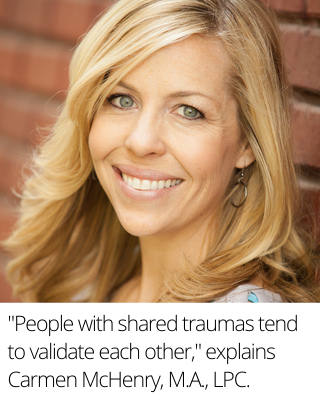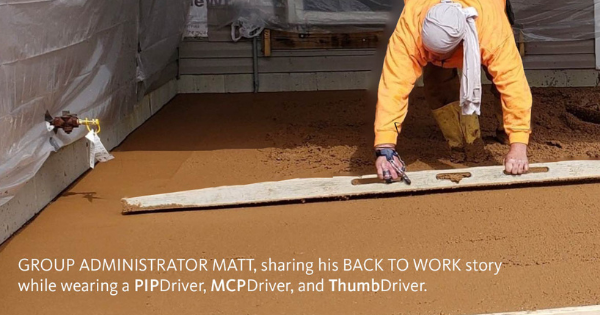“So today marks my year. I was lost trying to navigate my injury… In research I found this group. It changed the direction of my healing. Helped me realize I’m in charge of my recovery… I’m where I am because my choices and help from family like you. I’ve handed my heart and held others’ here. Seen love handed freely, cry for you, and spent hours on my knees asking for healing in your journeys… faces unseen, life’s so different you have carried me thru some really scary moments. Thankful, blessed, it’s a privilege to call this group ‘family.’ Thank You!” – Todd Binder, Finger and Partial Hand Amputee Peer + Support Group member.
Ask someone on the heels of a traumatic experience what they struggle with most, and they’re likely to tell you that they feel alone. They find it hard to relate to others because they don’t feel like others since their life-changing incident.
Thankfully, with the technology age, there are tools now available, resulting in advantages that could never have been imagined before. Internet-based support groups have been in existence for almost forty years, with social media-hosted forums becoming more and more prevalent. Therapists believe in its effectiveness and help us to understand why social media as therapy is so helpful and how it’s become more of an aid in healing than anyone imagined.

Whether we understand or agree with it or not, explains Family Trauma Specialist Carmen McHenry, M.A., LPC, “Feelings associated with a traumatic experience are often shame, embarrassment and guilt.” Something bad happened and they feel responsible or less-than for “allowing” it to happen. Mitch Manthey, whose middle and ring fingers were amputated in a work accident, wondered what he did wrong to have caused the accident, “Was I too close? Did I trip on something?”
Of course we all know that bad things happen to good people for no reason at all, but when you’re traumatized and you’re reflecting on the steps leading to your current situation, you’re hard on yourself. We all are. But those feelings are difficult to share with others, even those surrounding us with love and care and understanding. Even if we wanted to, we don’t always feel comfortable sharing those emotions with our loved ones because we know how much they love us and we don’t want to put more upon them; we don’t want them to worry.
And that’s where social media comes in as an effective outlet and an incredible source for information you want, information you need. And because there’s some level of anonymity in online interactions, many times we feel more comfortable asking hard or weird questions. People don’t know us, they don’t love us and they don’t REALLY have a stake in our lives so we feel free to say almost anything. And we do.

McHenry has seen first-hand, countless times over her 21 years as a therapist, the power of groupthink in a social media support group setting.
“I refer my patients to external resources like Facebook support groups frequently.” she details. “I have found that it helps them to feel validated in what ever feelings they’re coping with, feelings that I, as someone who hasn’t been through their exact situation, can’t validate on the level that those who have can.”
Interestingly, “The rarer the trauma is,” explains McHenry, “the more isolated the victim feels.” It makes sense, right? Something has happened to you that hasn’t happened to anyone close to you, so you feel outside the norm and you’re dealing with issues no one can relate to. And even if something similar has happened, your situation is unique and your challenges (serious, real-life challenges) are unique. But what social media has done is make those traumas less “rare” because people in similar situations are available and in abundance when the pool of potential like-minded people includes the entire globe (give or take), and at all hours of the day or night.
Finger and Partial Hand Amputee Peer + Support Group member Tanya explains it this way: “This was where I could go to for what (my family) couldn’t give me, which was understanding of what I was dealing with.”
Nothing warms the heart quite like seeing the interactions when someone still in disbelief and awe over their situation enter an online group and the people there waiting to immediately comfort, nurture and soothe them. They offer an attentive ear, they offer facts, humor, and through their positive outlook, they offer hope. “You’re in the right place,” they’ll say, “we understand and we’re here to help.” And they do.
From questions about the healing process, pain management, therapy, relationships, insurance, and how to keep a positive outlook, group members take new members into the fold with patience, understanding and answers. Rarely are questions asked not relatable to someone else in the group, however assumingly unusual the question or concern. “After my injury, I was only understood in this one place,” says Vanessa, Finger and Partial Hand Amputee Peer + Support Group member. And it’s not just the amputees who come for support, advice and community. Supportive family members find their way in too. So many moms, spouses and caring friends and family make their way into the group in search of tools they can use to help their loved ones. They seek out information on effective communication, product recommendations or just to commune with people who will simply understand and listen.

The beautiful thing about these groups, we’ve learned, is that many people who initially came for help themselves stay engaged in order to help others, folks who are just beginning their healing process. Helping others becomes a potentially unexpected part of their healing. What better way to make your injury, illness or new situation mean something than to use it to help others get through it?
At the end of the day, the most important information that the “old timers” in a social media support group can share with newbies is this: life goes on. The unknown aspects of it are scary and sometimes painful, but there is life beyond what happened, life beyond the loss. Even though their experience and counsel is important, the most important thing about their participation is that they are living proof that life goes on and that at some point, you will be able to see beyond your situation to focus on something else, like returning to work or helping others.
We’re quite lucky to be living in a time that has this technology available to us, technology that allows us our solitude while availing us to a literal world of information at our fingertips. It brings us close to people who understand our unique situation and want only to help make our journey easier. And they do that because they want to and because it makes them feel good, and helps them to heal from their own situations. The ability to “surround” ourselves with people who understand our current position while maintaining distance and anonymity is a gift that the generations before us didn’t benefit from. For that reason alone we are so, incredibly lucky.
The Finger and Partial Hand amputee Peer + Support Group was initiated to provide a space for amputees, family members, caregivers, hand therapists, nurses, prosthetists, billing specialists, and those pursuing a career in O&P to have a place to share and to learn about the challenges associated with finger and partial hand loss. If you or someone you know could benefit, please join us.


